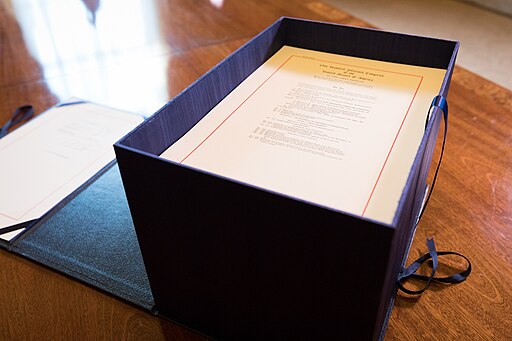
Sound advice from US Senator Mike Lee (R-UT): “As a rule, Americans shouldn’t trust any bill so large that it has to be delivered by handcart.” He’s referring to the latest “National Defense Authorization Act,” which weighs in at more than 3,000 pages.
Stopping at “Americans shouldn’t trust any bill” would improve Lee’s rule, but he’s a politician, so let’s give him some (cough) Lee-way and credit him with a good start.
There’s plenty of bad stuff crammed into the latest NDAA, not least renewal of the Foreign Intelligence Surveillance Act, which should really be called the “Illegally and Unconstitutionally Spying on Americans Act.” But as usual when it comes to NDAAs, I prefer to focus on the over-arching badness of the thing.
According to the congressional conference report on the bill, it “allocates $841.4 billion to the Pentagon, $32.4 billion to the Department of Energy and $438 million for other ‘defense-related activities.'”
That’s $1.3 trillion, or nearly $3,900 from each American adult and child, to maintain a gargantuan military machine that has about as much to do with “national defense” as the latest reboot of Frasier has to do with the original Cheers.
At present, the US armed forces include more than 1.3 million active duty troops and about 800,000 reservists. That’s about the same level as 50 years ago, when the US was just extricating itself from the Vietnam quagmire, when various automations (such as drones) were in their infancy, and when warm infantry bodies were a much bigger factor in war-fighting compared to today’s emphasis on air power.
In theory, at least, the US is at something called “peace” these days. Instead of fighting its own wars, it mostly farms them out to proxies like Ukraine and Israel, or at least “partners” with indigenous puppet regimes for manpower (e.g. Afghanistan).
And in truth, the US has few if any “defense” worries apart from the blowback its direct and proxy misadventures tend to culminate in. No other power in the world, let alone the western hemisphere, possesses the ability to invade, conquer, and occupy a United States with so much as 1/10th of its current military capabilities.
The US “defense” budget isn’t about “defense.” It’s equal parts corporate welfare, workfare for poor and middle class youth who need money for college, and “mad money” for politicians to get their megalomaniac on, trying to run the rest of the world as viciously and incompetently as they run their own little piece of it, with.
Which explains why it will pass in something like its current form. Lobbyists and politicians see lots of money — lots of YOUR money — and they want it. Ideally, all of it.
As I explain every time an NDAA bill comes up, remember that “defense spending” could be slashed by 90% without significant negative impact on “the national defense.”
Having remembered that, what to do with the knowledge? I guess you could call “your” congressional representatives, but that won’t do any good. They’ll keep blowing that money … as long as you keep giving it to them.
Thomas L. Knapp (Twitter: @thomaslknapp) is director and senior news analyst at the William Lloyd Garrison Center for Libertarian Advocacy Journalism (thegarrisoncenter.org). He lives and works in north central Florida.
PUBLICATION/CITATION HISTORY


